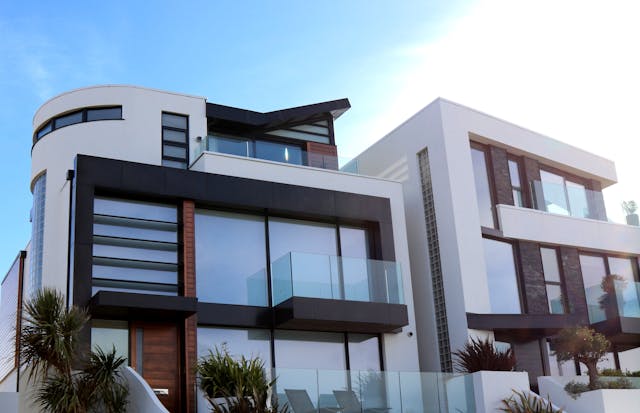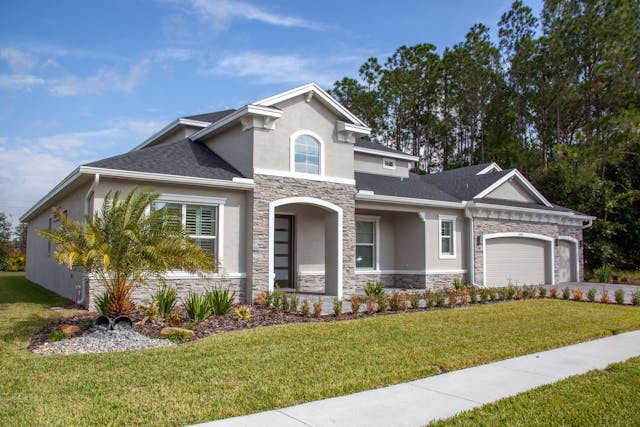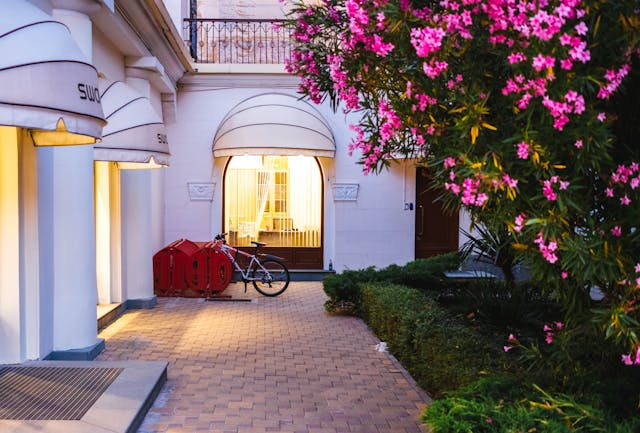In the world of property management, first impressions matter. A lot. Potential tenants often decide whether a property is worth their time and money within moments of seeing it. Landscaping, the art and science of enhancing the exterior spaces of a property, plays a crucial role in creating these first impressions. High-quality landscaping does more than just beautify a property; it can be a powerful tool in attracting high-quality tenants who value aesthetics, comfort, and a well-maintained living environment.
Curb Appeal: The First Impression That Counts
Curb appeal is the attractiveness of a property as viewed from the street. It’s the first thing potential tenants see when they visit or even just drive by. A well-manicured lawn, strategically placed plants, and tidy pathways create a welcoming atmosphere. This visual appeal can draw in passersby who might not have considered the property otherwise.
Properties with high curb appeal stand out in listings and attract more interest. When prospective tenants visit, they’re already predisposed to view the property positively. This initial impression sets the tone for the rest of the property tour, often leading to quicker leasing decisions.
High-quality tenants—those who are likely to pay rent on time, respect the property, and stay long-term—often look for properties that reflect their standards of living. They seek a place that they can feel proud of, both inside and out. A property with neglected or poorly maintained landscaping sends the wrong message, suggesting that the management might also neglect other aspects of the property.
Landscaping as an Extension of Property Maintenance
Tenants often equate the exterior condition of a property with its overall management. A well-maintained landscape indicates that the property management team is diligent, responsible, and attentive to detail. This reassures tenants that issues like maintenance requests and repairs will be handled efficiently, which is a significant factor for high-quality tenants.

Landscaping is more than just keeping the grass cut. It involves regular maintenance, such as trimming shrubs, planting seasonal flowers, mulching beds, and ensuring that irrigation systems are functioning properly. By demonstrating a commitment to these tasks, property managers show that they care about the tenant experience and the property’s long-term value.
A property that’s well cared for on the outside gives potential tenants confidence that the interiors will be just as well maintained. This can be a deciding factor for tenants who are on the fence, helping them choose your property over another.
Creating a Comfortable and Inviting Outdoor Space
High-quality tenants often seek more than just a place to sleep; they want a home where they can relax, entertain, and enjoy their surroundings. Landscaping plays a key role in providing these outdoor living spaces. Well-designed gardens, patios, and communal areas like BBQ pits or playgrounds can significantly enhance the living experience.
Consider the value of functional landscaping. A beautifully landscaped courtyard can become a social hub where residents gather, fostering a sense of community. An inviting patio area with comfortable seating and shade structures encourages tenants to spend time outdoors, which can improve their overall satisfaction with the property.
Functional outdoor spaces also appeal to tenants who enjoy outdoor activities. Whether it’s a well-kept lawn where children can play or garden spaces where residents can grow their own plants, these features add value to the property. High-quality tenants, particularly families and professionals, appreciate these additional amenities, which can set your property apart from competitors.
Environmental Impact and Sustainability
In today’s market, more and more tenants are conscious of their environmental footprint. Sustainable landscaping practices can attract these eco-minded tenants. Using native plants that require less water, installing rain gardens, and creating natural habitats for local wildlife are all practices that contribute to a property’s environmental sustainability.
High-quality tenants often look for properties that align with their values, including a commitment to sustainability. Landscaping that reduces water usage, minimizes chemical inputs, and supports local ecosystems can be a major selling point. Additionally, sustainable landscaping can lower operating costs through reduced water bills and maintenance expenses, which can be passed on as savings to tenants.
Promoting your property’s green landscaping initiatives in your marketing materials can attract a niche of tenants who prioritize eco-friendly living. These tenants tend to be responsible and committed, traits that translate into long-term, quality tenancies.
Enhancing Property Value and Tenant Retention
Landscaping doesn’t just attract new tenants; it also plays a crucial role in tenant retention. A well-maintained and aesthetically pleasing environment increases tenant satisfaction, making them more likely to renew their leases.
Properties with attractive landscaping are more likely to maintain high occupancy rates, reducing the costs and hassles associated with frequent tenant turnover. Happy tenants who enjoy their surroundings are also more likely to take better care of the property, reducing wear and tear and associated maintenance costs.
Moreover, beautiful landscaping increases the overall property value. This not only benefits property owners in terms of potential sale prices but also allows for competitive rental pricing. Tenants are often willing to pay more for a property that offers them a superior living environment, which includes well-designed and maintained outdoor spaces.
Landscaping as a Marketing Tool
Marketing a property effectively is essential in attracting high-quality tenants, and landscaping can be one of your strongest marketing tools. High-quality photos of well-maintained lawns, colorful flower beds, and inviting outdoor spaces can make your property stand out in listings. These images create an emotional connection with potential tenants, allowing them to imagine themselves living there.
Hosting open houses or property tours during seasons when the landscaping is at its peak can also be highly effective. Spring and summer are ideal times to showcase vibrant gardens and lush lawns. These tours provide a tangible experience that can be more persuasive than photos alone.
Offering virtual tours that highlight the landscaping can be particularly useful in attracting out-of-town tenants. By showcasing the property’s exterior beauty, you can appeal to tenants who might not be able to visit in person before making a decision.
Low-Maintenance Landscaping to Attract Busy Professionals
Many high-quality tenants, particularly busy professionals, look for properties that are easy to maintain. Landscaping that is both attractive and low-maintenance can be a big draw. Consider using drought-resistant plants, automated irrigation systems, and perennials that require less frequent care.

These features appeal to tenants who want a beautiful living environment without the burden of intensive upkeep. Low-maintenance landscaping is especially appealing in urban areas where tenants might have limited time or resources to manage a garden or lawn.
By investing in landscaping that looks great with minimal effort, you not only enhance the property’s appeal but also reduce the time and cost associated with ongoing maintenance. This approach ensures the property remains attractive throughout the year, regardless of tenant turnover.
Final Thoughts
Landscaping is much more than just an aesthetic consideration in property management; it’s a strategic tool that can significantly impact your ability to attract and retain high-quality tenants. By investing in well-designed, maintained, and sustainable landscaping, you enhance the overall appeal of your property, which translates into higher occupancy rates, better tenant retention, and increased property value.
High-quality tenants are discerning. They look for properties that reflect their standards of living and align with their values. By making landscaping a priority, you position your property as a desirable place to live, one that offers more than just four walls and a roof. It offers a lifestyle, a community, and a home.
For property managers looking to boost their portfolio and attract the best tenants, investing in landscaping is not just a good idea—it’s a key component of a successful strategy. The results are not just visible in the beauty of the property, but also in the satisfaction and loyalty of the tenants who choose to call it home.
